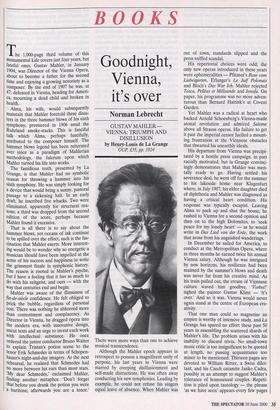BOOKS
Goodnight, Vienna, it's over
Norman Lebrecht
GUSTAV MAHLER - VIENNA: TRIUMPH AND DISILLUSION by Henry-Louis de La Grange OUP, £35, pp. 1024 The 1,000-page third volume of this monumental Life covers just four years, but fateful ones. Gustav Mahler, in January 1904, was Director of the Vienna Opera, about to become a father for the second time and enjoying a growing notoriety as a composer. By the end of 1907 he was, at 47, defeated in Vienna, heading for Ameri- ca, mourning a dead child and broken in health.
Alma, his wife, would subsequently maintain that Mahler foretold these disas- ters in the three hammer blows of his sixth symphony, premiered in 1906 amid the Ruhrland smoke-stacks. This is fanciful talk which Alma, perhaps fancifully, attributed to the composer himself. The hammer blows legend has been reiterated ever since as a paradigm of Mahlerian methodology, the fulcrum upon which Mahler turned his life into works.
The fastidious truth, presented by La Grange, is that Mahler had no symbolic reason for throwing a hammer into his sixth symphony. He was simply looking for a device that would bring a sunny, pastoral passage to a sickening halt. In an early draft, he inscribed five whacks. Two were eliminated, apparently for structural rea- sons; a third was dropped from the second edition of the score, perhaps because Mahler found it excessive.
That is all there is to say about the hammer blows, yet oceans of ink continue to be spilled over the effect, such is the fas- cination that Mahler exerts. More interest- ing would be to wonder why so energetic a musician should have been impelled at the acme of his success and happiness to write the grimmest finale in symphonic history. The reason is rooted in Mahler's psyche, but I have a feeling that it has as much to do with his zeitgeist, and ours — with the way that centuries end and begin. Mahler was aware of the flimsiness of fin-de-siecle confidence. He felt obliged to prick the bubble, regardless of personal cost. There was nothing he abhorred more than contentment and complacency. As Director in Vienna, he dragged opera into the modern era, with innovative design, uncut texts and an urge to invest each work with intellectual substance. He once ordered the junior conductor Bruno Walter to explain Tristan's potion scene to the tenor Erik Schmedes in terms of Schopen- hauer's night-and-day imagery. At the next rehearsal, he realised that Schmedes had no more between his ears than most stars. My dear Schmedes,' exclaimed Mahler, finding another metaphor. 'Don't forget that before you drank the potion you were a baritone; afterwards you are a tenor.' There were more ways than one to achieve musical transcendence.
Although the Mahler epoch appears in retrospect to possess a magnificent unity of purpose, his last years in Vienna were marred by creeping disillusionment and self-made distractions. He was often away conducting his new symphonies. Leading by example, he could not refuse his singers equal leave of absence. When Mahler was out of town, standards slipped and the press sniffed scandal.
His repertorial choices were odd; the only new operas introduced in these years were ephemeralities — Pfitzner's Rose vom Liebesgarten, Erlanger's Le Juif Polanais and Bloch's Das War Ich. Mahler rejected Tosca, Pelleas et Melisande and Jenufa. On paper, his programme was no more adven- turous than Bernard Haitink's at Covent Garden.
Yet Mahler was a radical at heart who backed Arnold Schoenberg's Vienna-made atonal revolution and admired Salome above all Strauss operas. His failure to get it past the imperial censor fuelled a mount- ing frustration at the Viennese obstacles that thwarted his unearthly ideals.
His departure from Vienna was precipi- tated by a hostile press campaign, in part racially motivated, but la Grange convinc- ingly demonstrates that Mahler was men- tally ready to go. Having settled his severance deal, he went off for the summer to his lakeside home near Klagenfurt where, in July 1907, his elder daughter died of diphtheria and Mahler was diagnosed as having a critical heart condition. His response was typically escapist. Leaving Alma to pack up and shut the house, he rushed to Vienna for a second opinion and then on to the high Dolomites, to 'seek peace for my lonely heart' — as he would write in Das Lied von der Erde, the work that arose from his anguished wanderings. In December he sailed for America, to conduct at the Metropolitan Opera, where in three months he earned twice his annual Vienna salary. Although he was intrigued by new horizons, his resilience had been maimed by the summer's blows and death was never far from his creative mind. As his train pulled out, the cream of Viennese culture waved him goodbye. `Vorbeir sighed the painter Gustav Klimt — 'it's over.' And so it was. Vienna would never again stand at the centre of European cre- ativity.
That one man could so magnetise an empire is worthy of intensive study, and La Grange has spared no effort these past 50 years in assembling the scattered shards of Mahler's life. The problem arises with his inability to discard trivia. No small-town music critic is too insignificant to be quoted at length, no passing acquaintance too minor to be mentioned. Thirteen pages are devoted to William Ritter, a Swiss dilet- tant, and his Czech catamite Janko Cadra, possibly in an attempt to suggest Mahler's tolerance of homosexual couples. Repeti- tion is piled upon tautology — the phrase `as we have seen' appears every few pages — almost burying Mahler beneath a mound of detritus. Does no one at Oxford wield an editor's pen?
Every Mahler lover, now and forever, is indebted to La Grange. This is the Life of Mahler to end all lives. However, judged on literary merit, it is more anthology than biography, a jumble of evidence, indispens- able yet irritatingly inconclusive.

































































 Previous page
Previous page